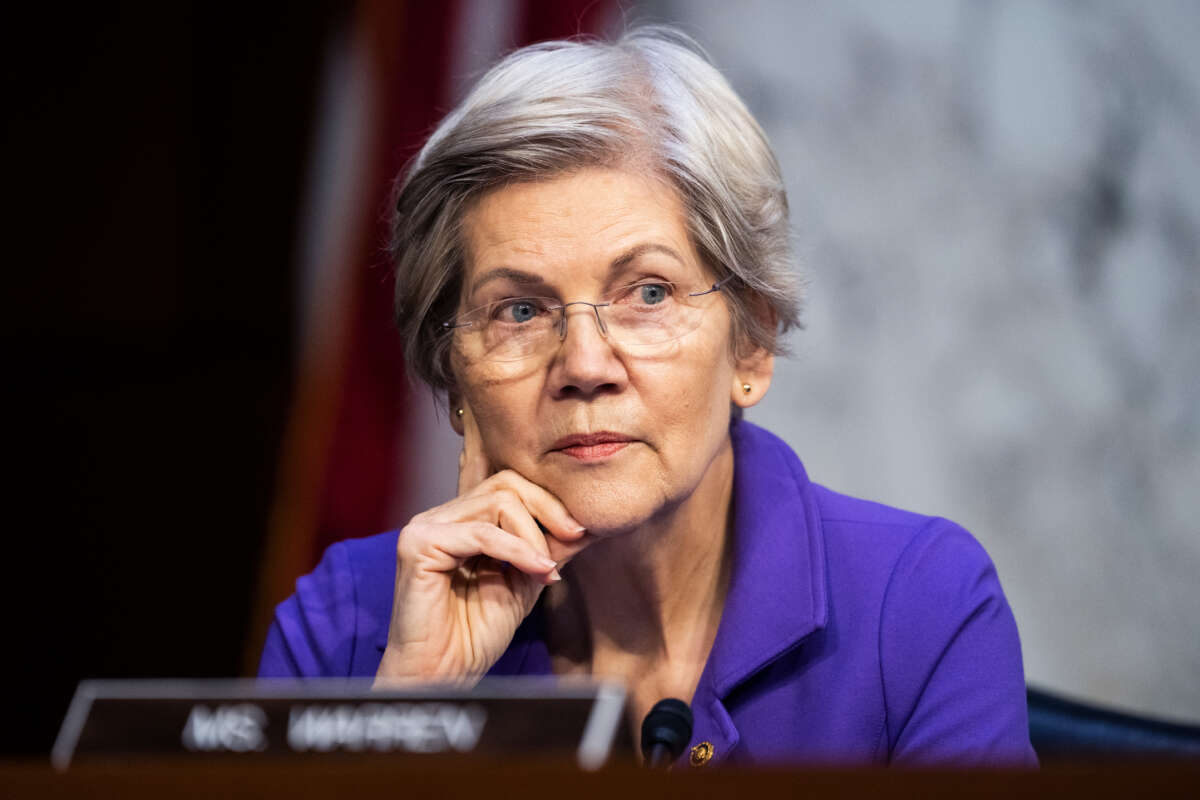On Tuesday, Sen. Elizabeth Warren (D-Massachusetts) and Rep. Katie Porter (D-California) unveiled legislation with dozens of cosponsors to undo a key part of a Donald Trump-era Dodd-Frank repeal passed years ago that lawmakers say caused the “entirely avoidable” failures of Silicon Valley Bank and crypto and Trump family lender Signature Bank.
The bill would repeal the portion of the major 2018 overhaul of post-recession protections, reinstating a far lower threshold at which banks are subject to risk management moves like stress tests and enhanced liquidity requirements. Under the bill, banks like Silicon Valley and Signature – as banks that control between $50 billion and $250 billion in assets – which aren’t currently subject to heightened regulatory scrutiny would once again be covered under Dodd-Frank protections.
“Both SVB and Signature Bank suffered from a toxic mix of poor risk management and weak supervision,” Warren said in a speech on the Senate floor on Tuesday. “If Congress and the Federal Reserve had not rolled back key provisions of Dodd-Frank, these banks would have been subject to strong liquidity and capital requirements to help withstand financial shocks.”
“Now, there are a lot more changes we need to make to our banking laws, there are many other provisions in the 2018 law that I oppose. But today, I remain focused on exactly the weakened rules that permitted banks like SVB and Signature to load up on risks, run up their profits, pay their executives giant bonuses, and, eventually, blow the banks to pieces.” she continued.
The bill is dubbed the Secure Viable Banking Act, or the SVB Act, in a nod to the initials of Silicon Valley Bank. It was introduced on the fifth anniversary of the Senate passage of the Dodd-Frank rollback, and has been cosponsored by 31 House Democrats and 16 Senate Democrats, including Senators Ed Markey (D-Massachusetts) and Bernie Sanders (I-Vermont), who have been outspoken about the Silicon Valley Bank failure.
“Five years ago, I helped lead the effort against the bank deregulation bill that led to the collapse of Silicon Valley Bank and Signature Bank. Now is the time to repeal that bill, break up too big to fail banks, and address the needs of working families, not vulture capitalists,” said Sanders. “We cannot continue to have more and more socialism for the rich and rugged individualism for everyone else.”
Markey also emphasized that the bank failures show the ease with which the rich get bailed out at the expense of taxpayers. “Taxpayers should not have to pay for the mistakes and mismanagement of big bank executives. The American people should have confidence in their financial institutions, and that starts with undoing Trump-era deregulation so that we can ensure a collapse like we saw last week never happens again,” Markey said.
President Joe Biden has also called for stricter bank requirements to be reinstated. On Monday, he called for Congress to strengthen bank regulations and reinstate protections put in under Dodd-Frank, which was put in place under President Barack Obama.
While the 2018 Dodd-Frank overhaul was led by Sen. Mike Crapo (Indiana), a Republican, it passed with bipartisan support in the House and the Senate, with the support of conservative Democrats like Sen. Joe Manchin (D-West Virginia) and then-Rep. Kyrsten Sinema (Arizona), who now classifies herself as an independent.
On Tuesday, Manchin even admitted that the deregulation was, perhaps, not the wisest move in the wake of the crisis – but still doubled down on his “yes” vote. He is not a cosponsor of the SVB Act, nor are any of the other Senate Democrats who had voted to roll back the regulations five years ago; fellow “yes” voter Sen. Jeanne Shaheen (D-New Hampshire) has also defended her vote.
Join us in defending the truth before it’s too late
The future of independent journalism is uncertain, and the consequences of losing it are too grave to ignore. To ensure Truthout remains safe, strong, and free, we need to raise $31,000 in the next 48 hours. Every dollar raised goes directly toward the costs of producing news you can trust.
Please give what you can — because by supporting us with a tax-deductible donation, you’re not just preserving a source of news, you’re helping to safeguard what’s left of our democracy.
